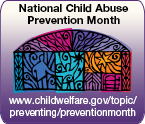Here are six protective factors we can all focus on to help build our families as identified by the child welfare office. Learning protective factors and making sure we make necessary changes in the home if these things aren't present is important to the prevention of child abuse.
Nurturing and Attachment
Show how much you love each other every day by smiling, hugging, listening and talking. Engage in regular activities with your children and become involved in their life. Kids notice your involvement in all aspects of their life.
Knowledge of Parenting and Child Development
Learn new things about children and learn new things about parenting. Ask questions and subscribe to appropriate info sources. Share what you learn when you learn something new. It also wouldn’t hurt to take parenting classes. I’m the first to admit that I’ve never been a parent before and I need a lot of help! It’s ok to need help sometimes.
Parental Resilience
Learn to bounce back from challenges. Learn appropriate coping skills for yourself. Take time for yourself to re-energize, share feelings, gain support systems and participate in activities such as exercising.
Social Connections
Fine people who provide emotional support. Such connections can be neighborhood or church attendants, play groups, or other support groups. Keep yourself connected. Don’t feel like you have to parent by yourself.
Concrete Supports for Parents
Meet day to day needs or know where to find help if needed. As I just mentioned, know that you don’t have to parent alone. If you need help find appropriate help from a professional. Find professional support in your areas by calling 2-1-1.
Social and Emotional Competence of Children
Children need to know they are loved and know they belong. Children also need to learn to get along with others. Regular routines, encouraging problem solving and teaching the importance of feelings and such ways for children to gain this competence.
For more information please visit Children's Bureau's website


 RSS Feed
RSS Feed
